35 start with C start with C

Between 1951 and 1962 nearly ten billion dollars in long-term capital (both direct investment and purchase of securities) flowed into Canada. This massive amount represented one third of all long-term capital moving among industrial nations. Its transfer marked the first time since before World War I that the world witnessed such a large-scale international movement of capital motivated primarily by a prospect of higher rates of return.
In Capital Transfers and Economic Policy the authors test the theory of the causes and effects of international capital movements against the evidence drawn from Canada's experience. They explore Canada's adjustment to capital flows and show how the operation of her economic policy is affected by the sensitivity of capital flows to the country's interest rates and foreign-exchange rate.
Their brilliant analysis is particularly valuable in light of current trends in capital flows among industrial nations and the June 1970 return of the Canadian dollar to a flexible exchange rate, which put the economy in a working situation similar to that of the fifties.
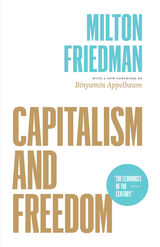
One of Times Literary Supplement’s 100 Most Influential Books Since the War
One of National Review’s 100 Best Nonfiction Books of the Century
One of Intercollegiate Studies Institute’s 50 Best Books of the 20th Century
How can we benefit from the promise of government while avoiding the threat it poses to individual freedom? In this classic book, Milton Friedman provides the definitive statement of an immensely influential economic philosophy—one in which competitive capitalism serves as both a device for achieving economic freedom and a necessary condition for political freedom.
First published in 1962, Friedman’s Capitalism and Freedom is one of the most significant works of economic theory ever written. Enduring in its eminence and esteem, it has sold nearly a million copies in English, has been translated into eighteen languages, and continues to inform economic thinking and policymaking around the world. This new edition includes prefaces written by Friedman for both the 1982 and 2002 reissues of the book, as well as a new foreword by Binyamin Appelbaum, lead economics writer for the New York Times editorial board.
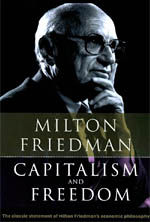
"Milton Friedman is one of the nation's outstanding economists, distinguished for remarkable analytical powers and technical virtuosity. He is unfailingly enlightening, independent, courageous, penetrating, and above all, stimulating."-Henry Hazlitt, Newsweek
"It is a rare professor who greatly alters the thinking of his professional colleagues. It's an even rarer one who helps transform the world. Friedman has done both."-Stephen Chapman, Chicago Tribune
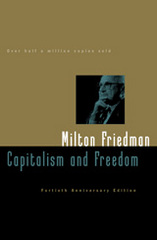
How can we benefit from the promise of government while avoiding the threat it poses to individual freedom? In this classic book, Milton Friedman provides the definitive statement of his immensely influential economic philosophy—one in which competitive capitalism serves as both a device for achieving economic freedom and a necessary condition for political freedom. The result is an accessible text that has sold well over half a million copies in English, has been translated into eighteen languages, and shows every sign of becoming more and more influential as time goes on.
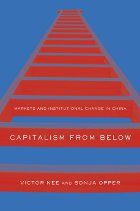
More than 630 million Chinese have escaped poverty since the 1980s, reducing the fraction remaining from 82 to 10 percent of the population. This astonishing decline in poverty, the largest in history, coincided with the rapid growth of a private enterprise economy. Yet private enterprise in China emerged in spite of impediments set up by the Chinese government. How did private enterprise overcome these initial obstacles to become the engine of China’s economic miracle? Where did capitalism come from?
Studying over 700 manufacturing firms in the Yangzi region, Victor Nee and Sonja Opper argue that China’s private enterprise economy bubbled up from below. Through trial and error, entrepreneurs devised institutional innovations that enabled them to decouple from the established economic order to start up and grow small, private manufacturing firms. Barriers to entry motivated them to build their own networks of suppliers and distributors, and to develop competitive advantage in self-organized industrial clusters. Close-knit groups of like-minded people participated in the emergence of private enterprise by offering financing and establishing reliable business norms.
This rapidly growing private enterprise economy diffused throughout the coastal regions of China and, passing through a series of tipping points, eroded the market share of state-owned firms. Only after this fledgling economy emerged as a dynamic engine of economic growth, wealth creation, and manufacturing jobs did the political elite legitimize it as a way to jump-start China’s market society. Today, this private enterprise economy is one of the greatest success stories in the history of capitalism.
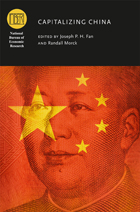
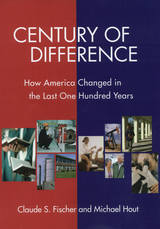


These Chicago economists share a common intellectual framework universally recognized in the profession and derived from three beliefs: first, that theory is of fundamental importance; second, that theory is irrelevant unless set in a definite empirical context; and third, that in the absence of evidence to the contrary, the market works. Critics of the Chicago school tend to ignore the first two of these and to overlook the qualifying proviso of the third. This volume sets out to rectify that misunderstanding and to circulate more widely some of the best work produced by the Chicago school.
The essays in the opening "general" section clearly illustrate the characteristics of the Chicago school while also reflecting some well-known idiosyncrasies of four of its more prominent spokesmen. The other two sections, "Domestic Policy" and "Trade and Aid," cover topics on which Chicago authors have made a marked impact. Together, these essays will provide a basic reference book for students of the subject, illustrating one of the leading methods of analyzing economic development problems.
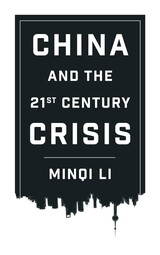
Li roots his argument in an analysis of the political and economic imbalances in China that would exacerbate a crisis, and possibly even precipitate a full collapse—and he shows in detail the reasons why that collapse could happen much more quickly than anyone imagines. Writing from a Marxist and ecologically oriented perspective, Li shows unequivocally that the limits to capitalism are fast approaching, and that events in China—essentially the last great frontier for capitalist expansion—are likely to be pivotal.
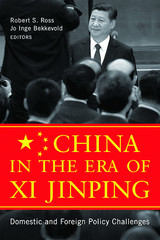
Since becoming president of China and general secretary of the Chinese Communist Party, Xi Jinping has emerged as China's most powerful and popular leader since Deng Xiaoping. The breathtaking economic expansion and military modernization that Xi inherited has convinced him that China can transform into a twenty-first-century superpower.
In this collection, leading scholars from the United States, Asia, and Europe examine both the prospects for China's continuing rise and the emergent and unintended consequences posed by China's internal instability and international assertiveness. Contributors examine domestic challenges surrounding slowed economic growth, Xi's anti-corruption campaign, and government efforts to maintain social stability. Essays on foreign policy range from the impact of nationalist pressures on international relations to China’s heavy-handed actions in the South China Sea that challenge regional stability and US-China cooperation. The result is a comprehensive analysis of current policy trends in Xi's China and the implications of these developments for his nation, the United States, and Asia-Pacific.
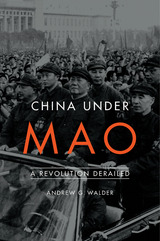
China’s Communist Party seized power in 1949 after a long period of guerrilla insurgency followed by full-scale war, but the Chinese revolution was just beginning. China Under Mao narrates the rise and fall of the Maoist revolutionary state from 1949 to 1976—an epoch of startling accomplishments and disastrous failures, steered by many forces but dominated above all by Mao Zedong.
“Walder convincingly shows that the effect of Maoist inequalities still distorts China today…[It] will be a mind-opening book for many (and is a depressing reminder for others).”
—Jonathan Mirsky, The Spectator
“Andrew Walder’s account of Mao’s time in power is detailed, sophisticated and powerful…Walder takes on many pieces of conventional wisdom about Mao’s China and pulls them apart…What was it that led so much of China’s population to follow Mao’s orders, in effect to launch a civil war against his own party? There is still much more to understand about the bond between Mao and the wider population. As we try to understand that bond, there will be few better guides than Andrew Walder’s book. Sober, measured, meticulous in every deadly detail, it is an essential assessment of one of the world’s most important revolutions.”
—Rana Mitter, Times Literary Supplement


As the world is drawn together with increasing force, our long-standing isolation from—and baffling ignorance of—China is ever more perilous. This book offers a powerful analysis of China and the transformations it has undertaken since 1989.
Wang Hui is unique in China’s intellectual world for his ability to synthesize an insider’s knowledge of economics, politics, civilization, and Western critical theory. A participant in the Tiananmen Square movement, he is also the editor of the most important intellectual journal in contemporary China. He has a grasp and vision that go beyond contemporary debates to allow him to connect the events of 1989 with a long view of Chinese history. Wang Hui argues that the features of contemporary China are elements of the new global order as a whole in which considerations of economic growth and development have trumped every other concern, particularly those of democracy and social justice. At its heart this book represents an impassioned plea for economic and social justice and an indictment of the corruption caused by the explosion of “market extremism.”
As Wang Hui observes, terms like “free” and “unregulated” are largely ideological constructs masking the intervention of highly manipulative, coercive governmental actions on behalf of economic policies that favor a particular scheme of capitalist acquisition—something that must be distinguished from truly free markets. He sees new openings toward social, political, and economic democracy in China as the only agencies by which the unstable conditions thus engendered can be remedied.
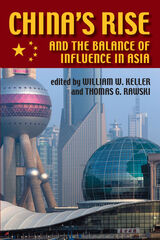
China's protracted boom and political transformation is a major episode in the history of global political economy. Beginning in the late 1970s, China experienced a quarter century of extraordinary growth that raised every indicator of material welfare, lifted several hundred million out of poverty, and rocketed China from near autarky to regional and even global prominence. These striking developments transformed China into a major U.S. trade and investment partner, a regional military power, and a major influence on national economies and cross-national interchange throughout the Pacific region. Beijing has emerged as a voice for East Asian economic interests and an arbiter in regional and even global diplomacy-from the Asian financial crisis to the North Korean nuclear talks. China's accession to the World Trade Organization promises to accentuate these trends.
The contributors to this volume provide a multifaceted examination of China in the areas of economics, trade, investment, politics, diplomacy, technology, and security, affording a greater understanding of what relevant policies the United States must develop. This book offers a counterweight to overwrought concerns about the emerging “Chinese threat” and makes the case for viewing China as a force for stability in the twenty-first century.
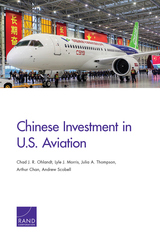

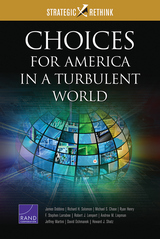

Now that the welfare system has been largely dismantled, the fate of America's poor depends on what happens to them in the low-wage labor market. In this timely volume, Katherine S. Newman explores whether the poorest workers and families benefited from the tight labor markets and good economic times of the late 1990s. Following black and Latino workers in Harlem, who began their work lives flipping burgers, she finds more good news than we might have expected coming out of a high-poverty neighborhood. Many adult workers returned to school and obtained trade certificates, high school diplomas, and college degrees. Their persistence paid off in the form of better jobs, higher pay, and greater self-respect. Others found union jobs and, as a result, brought home bigger paychecks, health insurance, and a pension. More than 20 percent of those profiled in Chutes and Ladders are no longer poor.
A very different story emerges among those who floundered even in a good economy. Weighed down by family obligations or troubled partners and hindered by poor training and prejudice, these "low riders" moved in and out of the labor market, on and off public assistance, and continued to depend upon the kindness of family and friends.
Supplementing finely drawn ethnographic portraits, Newman examines the national picture to show that patterns around the country paralleled the findings from some of New York's most depressed neighborhoods. More than a story of the shifting fortunes of the labor market, Chutes and Ladders asks probing questions about the motivations of low-wage workers, the dreams they have for the future, and their understanding of the rules of the game.

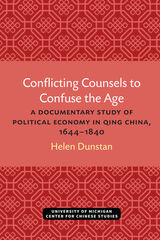
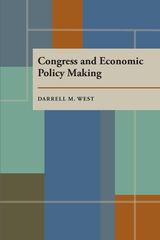
Economic policymaking has perpetually been one of the central dilemmas facing Congress, leading to huge budget deficits and disagreements among legislators about spending priorities and tax policies.
This book examines congressional decision making on economic policy during the Reagan administration. It looks at legislative actions on Reaganomics, tax reform, and the politics of deficit reduction, and shows the importance of looking not just at the consequences of these decisions but also at the legislative processes that led to them.
Using an “activist-based” approach and previously unexamined data, Darrell West shows that district activists, often more conservative than the public at large, exerted a disproportionate and misleading effect on congressional voting. When this support eventually proved unstable, a more skeptical Congress began to eventually back away from the president's policies. This move had serious consequences for deficit reduction and policy initiation, and also influenced the final shape of the tax reform package adopted in 1986.

In the 1990s at Fort Bragg and Fayetteville, North Carolina, the city's dominant political coalition of white civic and business leaders had lost control of the city council. Amid accusations of racism in the police department, two white council members joined black colleagues in support of the NAACP's demand for an investigation. George Baca's ethnographic research reveals how residents and politicians transformed an ordinary conflict into a "crisis" that raised the specter of chaos and disaster. He explores new territory by focusing on the broader intersection of militarization, urban politics, and civil rights.
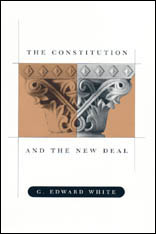
In a powerful new narrative, G. Edward White challenges the reigning understanding of twentieth-century Supreme Court decisions, particularly in the New Deal period. He does this by rejecting such misleading characterizations as "liberal," "conservative," and "reactionary," and by reexamining several key topics in constitutional law.
Through a close reading of sources and analysis of the minds and sensibilities of a wide array of justices, including Holmes, Brandeis, Sutherland, Butler, Van Devanter, and McReynolds, White rediscovers the world of early-twentieth-century constitutional law and jurisprudence. He provides a counter-story to that of the triumphalist New Dealers. The deep conflicts over constitutional ideas that took place in the first half of the twentieth century are sensitively recovered, and the morality play of good liberals vs. mossbacks is replaced. This is the only thoroughly researched and fully realized history of the constitutional thought and practice of all the Supreme Court justices during the turbulent period that made America modern.
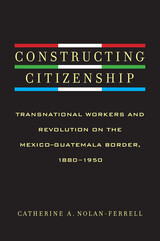

For economists, the two countries offer an interesting test case for examining similar reform programs launched from disparate political and economic systems. For policymakers concerned with the region's stability, a clear view of the economic futures of these two major powers is paramount.
Examining and comparing the reform experiences of China and India up to the present, George Rosen shows that although China enacted more sweeping reform measures and produced more impressive local growth, it also experienced more significant inflationary spurts. Two-thirds of each nation's population was involved in agriculture at the start of the reform period and nearly that many at the conclusion. Ultimately, the effects of the past industrial reforms in both countries in terms of significantly greater industrial employment or well-being of their populations were limited. An important lesson in these findings, argues Rosen, is that they actually reveal more about the political factors that limit and shape economic policy reforms in a dictatorship or democracy than they confirm the virtues of either capitalism or communism.
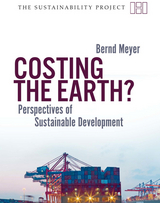
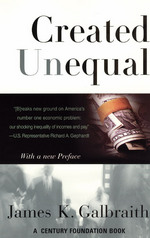
"Created Unequal is not light reading, but Galbraith's elegant arguments, passionate exposition, and profound conclusions make it worth the trouble. . . . [Galbraith] remind[s] us that the economy is and ought to be run by humans, not humans by the economy."—Joanna Ciulla, Los Angeles Times Book Review
"Created Unequal is a lucid and wise explanation of why America seems to be prospering while most Americans aren't. James Galbraith takes steady aim at a variety of widely accepted economic myths and hits most of them dead center. This book will tell you a lot about the way your economic world really works."—Jeff Faux, President of the Economic Policy Institute
"[A] brilliant and iconoclastic examination of the major social trend of our time."—Michael Lind, Washington Monthly
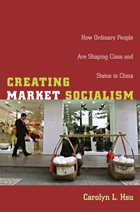
Hsu’s ethnographic research, conducted in the city of Harbin in northwestern China, included participant observation at twenty workplaces and interviews with working adults from a range of professions. By analyzing the shared stories about status and class, jobs and careers, and aspirations and hopes that circulate among Harbiners from all walks of life, Hsu reveals the logic underlying the emerging stratification system. In the post-socialist era, Harbiners must confront a fast-changing and bewildering institutional landscape. Their collective narratives serve to create meaning and order in the midst of this confusion. Harbiners collectively agree that “intellectuals” (scientists, educators, and professionals) are the most respected within the new social order, because they contribute the most to Chinese society, whether that contribution is understood in terms of traditional morality, socialist service, or technological and economic progress. Harbiners understand human capital as an accurate measure of a person’s status. Their collective narratives about suzhi shape their career choices, judgments, and child-rearing practices, and therefore the new practices and institutions developing in post-socialist China.
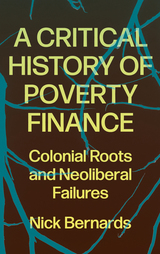
A comprehensive historical tracing of how the contemporary finance-poverty-development nexus emerged.
'The definitive account of the history of poverty finance' - Susanne Soederberg
Finance, mobile, and digital technologies - or 'fintech' - are being heralded in the world of development by the likes of the IMF and World Bank as a silver bullet in the fight against poverty. But should we believe the hype?
A Critical History of Poverty Finance demonstrates how newfangled 'digital financial inclusion' efforts suffer from the same essential flaws as earlier iterations of neoliberal 'financial inclusion.' Relying on artificially created markets that simply aren't there among the world's most disadvantaged economic actors, they also reinforce existing patterns of inequality and uneven development, many of which date back to the colonial era.
Bernards offers an astute analysis of the current fintech fad, contextualized through a detailed colonial history of development finance, that ultimately reveals the neoliberal vision of poverty alleviation for the pipe dream it is.

Through her rich ethnography of indigenous marches, demonstrations, occupations, and negotiations, Sawyer tracks the growing sophistication of indigenous politics as Indians subverted, re-deployed, and, at times, capitulated to the dictates and desires of a transnational neoliberal logic. At the same time, she follows the multiple maneuvers and discourses that the multinational corporation and the Ecuadorian state used to circumscribe and contain indigenous opposition. Ultimately, Sawyer reveals that indigenous struggles over land and oil operations in Ecuador were as much about reconfiguring national and transnational inequality—that is, rupturing the silence around racial injustice, exacting spaces of accountability, and rewriting narratives of national belonging—as they were about the material use and extraction of rain-forest resources.
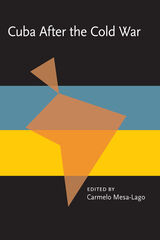

The Cuban economy has been transformed over the course of the last decade, and these changes are now likely to accelerate. In this edited volume, prominent Cuban economists and sociologists present a clear analysis of Cuba’s economic and social circumstances and suggest steps for Cuba to reactivate economic growth and improve the welfare of its citizens. These authors focus first on trade, capital inflows, exchange rates, monetary and fiscal policy, and the agricultural sector. In a second section, a multidisciplinary team of sociologists and an economist map how reforms in economic and social policies have produced declines in the social standing of some specific groups and economic mobility for others.
A joint collaboration between scholars at Harvard University and in Cuba, this book includes the same editors and many of the same authors of The Cuban Economy at the Start of the Twenty-First Century (edited by Jorge I. Domínguez, Omar Everleny Pérez Villanueva, and Lorena G. Barberia), which is also part of the David Rockefeller Center series.

How can Cuba address the challenges of economic development and transformation that have bedeviled so many Latin American and Eastern European countries? What are the universally common macroeconomic and societal challenges it faces and the specific peculiarities that have emerged after a decade-long transformation of its economy?
For the Cuban and American social scientists and policy experts writing in this timely and provocative volume, the answer lies in examining Cuba’s development trajectory by delving into issues ranging from the political economy of reform to their impact on specific sectors including export development, foreign direct investment, and U.S.–Cuba trade. Moreover, the volume also draws attention to the intersection between economic reform and societal dynamics by exploring changes in household consumption, socioeconomic mobility, as well as remittances and their effects, while remaining steadfast in its focus on their policy implications for Cuba’s future.

After providing background information on Cuba's prerevolutionary economy, Brunner explores the effects of Communist ideology and the U.S. embargo on the country's resources and trade, and analyzes the problems Cuba faced in shifting from trade with the U.S. to trade with the Soviet Union and Soviet bloc. He evaluates their implementation of the development plan, assessing the sugar industry within Cuba as well as how its accelerated development affected the rest of the domestic economy.
READERS
Browse our collection.
PUBLISHERS
See BiblioVault's publisher services.
STUDENT SERVICES
Files for college accessibility offices.
UChicago Accessibility Resources
home | accessibility | search | about | contact us
BiblioVault ® 2001 - 2024
The University of Chicago Press









